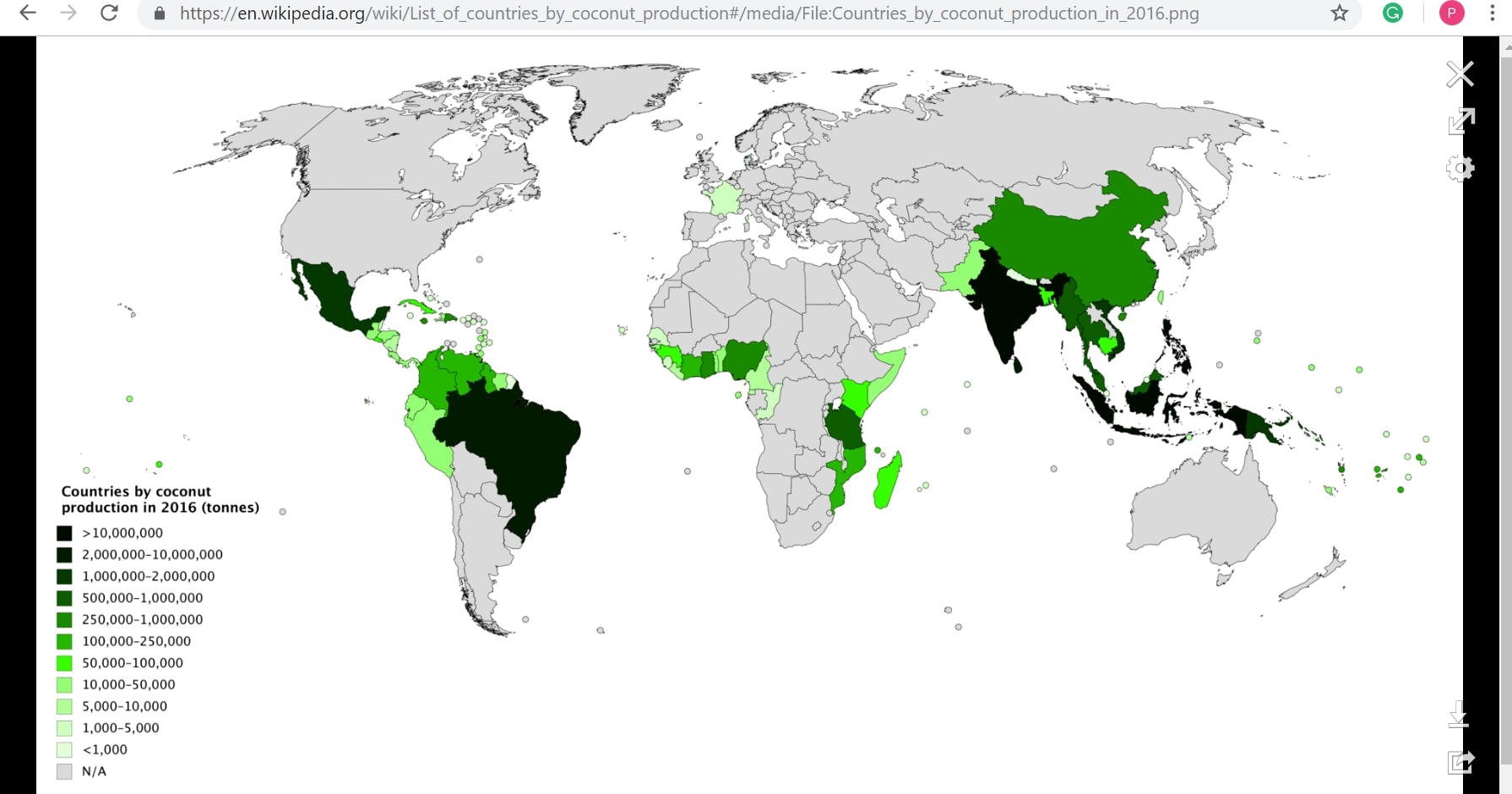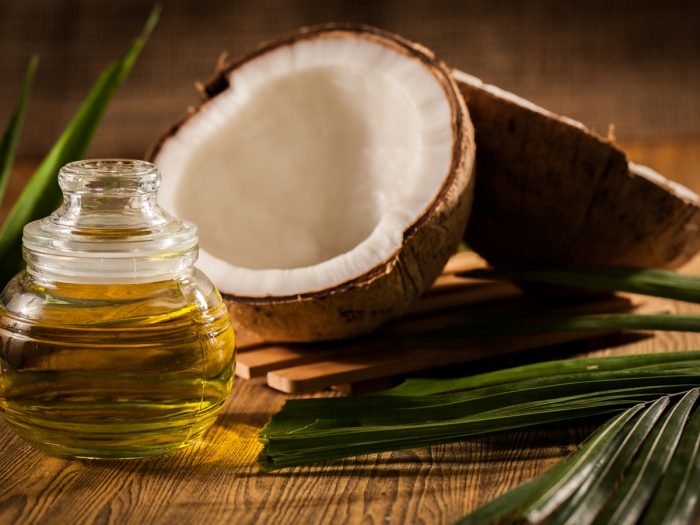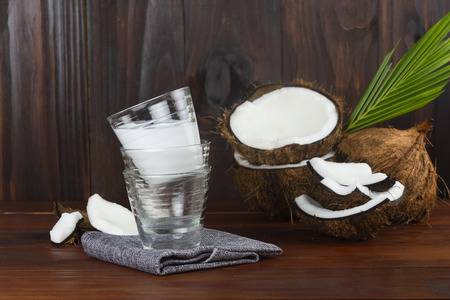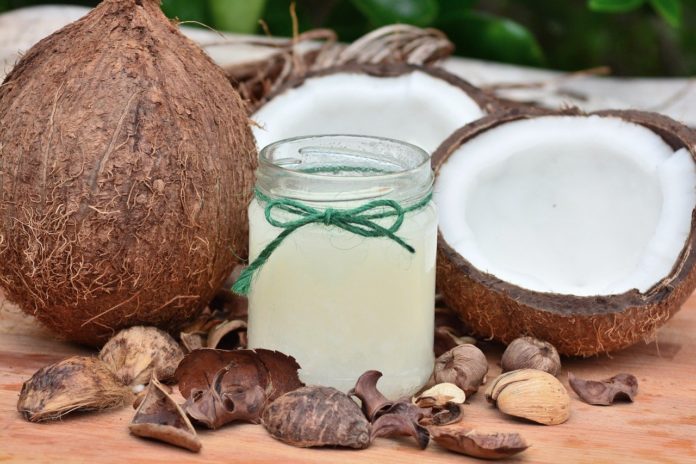When I think of coconuts, first I imagine a sandy beach with the distant sound of the ocean. A light breeze, some beautiful trees, and the sun gently kissing my skin. I think of paradise, not much else.
But when I think deeper about it, those coconuts we see on the groceries shelves, in drinks, in pastries or in beauty products. They got harvested by someone, somewhere because there are many buyers but do we really know their methods?
Some of us running Eco friendly businesses claim to have environmentally friendly products but how do we really know if it’s true or not? We do the research to figure it out.
That’s what I did, for all of you out there wondering. I found the answers to your question (with added bonuses too).
We are going to go through and observe various facts about coconuts in this article.
Here are 4 things you can expect to learn from reading this:
- What coconuts are and where they come from
- A quick history of coconuts
- What the uses of coconuts are
- Are coconuts Eco friendly?
Now without further adieu, lets get started!
What are coconuts and where do they come from?
The coconut tree is a member of a tree group called Aracaceae and it is also the only living species named genus Cocos. The term coconut refers to various parts of the plant including it’s leaves, roots, the seed and of course the fruit.
Harvesting
Coconuts come from the top part of the tree and are generally ready to be harvested 6-7 months after their emergence. To determine if they are ready, using a ladder or rope, the farmer will climb up the tree and test if the coconut is ripe by tapping it with a blade, if it is indeed determined ready, it will either be cut and dropped to the ground or carefully roped down.
Coconut has been industrialized for several decades now. While there are several properties of the coconut tree or even the fruit that people have embraced for a long time, one of the most useful products is the highly celebrated coconut oil.
If you take a closer look at the history of coconut oil, you are likely to notice that this was one of the major ingredients in historical medicine.
A quick history of coconuts
Coconuts have had an incredible history of adaptability, they originated in the western Pacific but spread all over the world and throughout the Indian ocean in ways we still haven’t completely figured out.
The most obvious way would be through human interference but some say the coconuts floated off to different parts of the world through the ocean currents!
There is a degree of recorded history of the people from the Pacific isles that describe the various uses of coconuts. The most important, other than source of food, was for coconut oil. There were various medicinal properties observed by the ancient people that have been verified today.
Medical properties
Since coconuts palm trees spread all over the world, a variety of different cultures benefited from its medical properties. Cultures such as the natives of Papua New Guinea, the people of India (for over 5000 years now) in their Ayurveda medicine, the inhabitants of Panama, the Jamaicans and several tribes in African countries like Nigeria, Ethiopia and Somalia.

All of these cultures discovered many interesting medical properties.
The 5 most well known every day applications of coconut oil
- Home remedy for illness: A glass of coconut oil is believed by the people of Panama to help in a speedy recovery against the cold and common flu.
- Health Tonic: The people of Jamaica consider coconut oil to be a powerful tonic that benefits the heart. It is commonly used along side other medication to help fight any kind of illness.
- Hair Treatment: In Papua New Guinea coconut oil is widely used as a hair conditioner that promotes hair growth, nourishes the scalp, provides essential vitamins and fatty acids.
- Skin moisturizer: Coconut oil is well known for its anti-bacterial and anti-fungal properties. It nourishes your skin while sinking in quickly and keeping you smooth. It works wonderfully as a face moisturizer.
- Cooking: It can be used as a replacement to other oils and butter for cooking. Along with its high content of good saturated fat, it contains no trans fat and is cholesterol free. A great choice for your family.
What are the other lesser known uses of coconuts?
As we have seen, coconut was traditionally used as a source of food and medicine by people from every corner of the world. That’s not where it ends though, we have explored further and discovered even more uses for coconuts, here is a list of other lesser known uses:
Lesser Known uses of Coconut Oils

- Eliminating Parasites: While coconut oil also works, there are several studies that support the use of coconut meat for tackling parasites. The high content in fiber and it’s special properties create a combo that destroys parasites such as hook worm and ring worms. Look at the studies here on coconut oil by Jennifer, the Hybrid Rasta Mama.
- Cancer Treatment: The US National institute of health speaks of coconut oil as a great supplementation to cancer patients, increasing their quality of life by alleviating symptoms such as fatigue, dyspnea, sleep difficulties and loss of appetite.
- Digestive boost: Coconut oil helps in case of any stomach problems by improving digestion and bowel functions.
- Bio diesel: One of the most daring Eco friendly usage of coconut oil is in its use as biodiesel. What this means is that it can be used as fuel in diesel engines. Some engines are specifically designed to work on vegetable oils.
Coconut leaves
As we have mentioned in the beginning, every part of a coconut tree can be used for different applications. Coconut leaves have been traditionally used for as long as other derivatives have. Even today, we still find uses for coconut leaves such as:
- A relief for muscular pain: Coconut leaves have been well known to be quite effective at relieving muscular pain. In this case, if you want to use it to relieve the said condition, it is encouraged to collect some leaves from any coconut tree in your vicinity and boil them. The mixture is then applied to the affected area. Alternatively, bathe with the solution.
- Treatment for acne scars: If you take time to bathe with the mixture on the affected areas, you are also likely to impact on acne scars directly. Coconut leaves have properties that help heal and moisturize skin.
Coconut milk

Is coconut milk healthy? Yes! Coconut milk has many health benefits proven by science. It is not only used as a source of food but also for physical applications. Below are some of the health benefits of coconut milk:
- Treating eye infection: This milk has been in use for several years to treat some eye infections. You can use coconut milk to wash the affected area.
- A sore throat: Coconut milk’s calming qualities can help in treating sore throat,
- Stomach Ulcers: Drinking coconut milk calms the digestive system.
- Mouth sores: Gargling coconut water helps relieve and heal mouth sores.
Coconut water
The liquid is extracted by breaking the coconut fruit into two. There is a claim swearing that coconut water is identical to blood plasma, and it was used in world war II as intravenous rehydration fluid, while I’m not so sure about that, it’s true that coconut water can work wonders especially when you are seeking to correct several health conditions. First thing first, coconut water is an energy drink, it helps with conditions such as:
- Kidney problems: Drinking coconut oil can keep your kidneys functioning the right way. It helps to reverse some of the main kidney problems.
- Sunburns: If you have been on the direct sun for too long and feels like sun rays have affected your skin, then you can use coconut oil to deal with the situation. Just apply coconut oil on the affected area and the rest will follow.
- Upset Stomach: Coconut oil has some properties that help to relieve upset stomach. It also contains potassium and natural vitamin C which helps to keep your stomach on the best conditions.
Young coconut
Fun Facts: Young and green coconuts have a special use. They can be used to treat abdominal pains. It’s easy, if you want to use this home remedy for abdominal pains, then break a young coconut and heat it. After that, eat the inside of the coconut. If you do this several times, then the pain should go away.
Coconut roots
Coconut roots can be used as a natural remedy for several health conditions. It can be used to treat gallbladder problems and several other urinary tract related issues. If you want to use coconut roots for this benefit, then get two or three roots and boil them. After that drink the mixture and wait for the results. You should repeat this several times a day for significant results.
Coconut husks
We all know that coconut is made up of very strong fiber and but did you know the material between those fibers has a high lignin content which can act as natural glue? Coconut husk has a variety of uses in the creation of crafts such as:
- Biodegradable chairs: Coconut husks can as well be used to make biodegradable chairs. When the fibers of the coconut husks are combined with a small amount of latex, you can mold it into environmentally friendly chairs.
- Masking ropes: I bet that you wouldn’t have guessed that coconut husks can be used to make ropes. I mean who would try it other than someone stranded on an island? But the matter of fact is, the fibers in coconut husks can be separated and branded into very strong ropes for our daily usage.
- Floor mats and rugs: This is probably the most common use, it can be used to make mats and rugs. It involves weaving the fibers of a coconut husk into durable rugs and mats and has become a quite popular use in door mats.
- Scrubber brush: As we have mentioned, coconut husks contains very strong fibers. These fibers can be used to make a great scrubbing brush.
- Pet house: Coconut shells can also be used as pet houses for small pets such as birds, crabs, and hamsters.
The list just seemed to go on and on, how many uses do coconuts have? I was shocked to find some many, and I feel I could list even more! For now, though we are going to move on to the real question we’ve been waiting for:
How Eco friendly are coconuts?
If you were keen when reading this article, you should have already noted some of the most environmentally friendly facts about coconuts. A good example is how coconut oil can be used as a Biodiesel. This helps counter and reduce the effects of petroleum products on air and soil pollution.
Coconut oil is also termed as the most effective alternative to toxic lotions and other skin care products, which promotes health and doesn’t negatively impact the environment when disposed of. These are some interesting factors but…
Usually, the determining factor in Eco-friendliness is the production method.
Let’s look at the facts:
The Pros:
- Economy: The growing demand for coconut products are increasing the need for supply, which in turn is giving job opportunities to people living in areas of the world where coconut trees can be planted.
- Harvesting Method: Coconuts are harvested without the use of machinery. This can be seen as a positive as it helps to reduce the impacts of these machine on the environment.
- Manure: Coconut trees greatly benefits from the application of manure in the early stages of its growth. This promotes the local economy to compost and creates organic manure to supply coconut growers.
- Cover Crops: Don’t be fooled, not every producer of coconuts use mono-culture. There are specific plants and herbs that can be grown at the base of the tree that benefits both parties such as sunnhemp and calopogonium.
The Cons:
- Pesticides: While growing coconut trees doesn’t require the application of harmful pesticides or herbicides, serious farmers do use them to increase yields as they as susceptible to some diseases and pest.
- Transportation Methods: Unless you live in an area where coconuts are grown locally, it requires a lot of fuel and transportation to get to your location.
- Biodiversity: Farming in mono-culture always goes back to the choice made by the farmer, it isn’t necessary but depending on the business model, some farmers will focus on quantity over quality. Mono-culture farming greatly reduces biodiversity in areas that were previously diverse.
- Irrigation: It is often seen as having a negative impact on the environment as water from rivers and lakes is diverted to plantations. Most of the water ends up lost before it arrives (soil absorption and evaporation).
Conclusion
When it comes down to it, determining whether it’s Eco-friendly or not depends on the production methods. We can clearly see all the benefits and uses after discovering our mentioned coconut facts. On top of that planting trees stunts the emissions of carbon dioxide in our atmosphere.
From all these facts about coconuts, we can determine that generally, they are Eco Friendly.
If you want to be careful and make sure your use of coconuts has minimal impact on the environment and stay true to your green entrepreneur title, look at who the suppliers of your coconut products are and find out if their growing methods are Eco friendly.
As for my opinion on the matter, I recommend the use of coconuts. I believe we are better off using naturally made products than cheaper oil-based or synthetics alternatives. We should continue to support local economies around the world that rely on coconut production.
Fun Fact: National coconut Day is Septembre 2! Let’s not forget to celebrate it this year!
The coconut farmers thank you for reading!

If you enjoyed this article, you might enjoy these too:
– Eco Friendly Packaging: The Ultimate Guide
– All The Facts About Bamboo That You Need To Know


Hello,
If you want to go into coconut farm business, There are so many company website this days like http://www.virtatrade.com that will enable you as a beginner to raise the fund you need to start up your coconut farm business without you seeking for a loan.
This company is where many business dealers from all over the world generate fund that backup their various businesses financially.
I used this company to backup my cocoa beans export business each time my business is running down.
You can visit and register with the company website here http://www.virtatrade.com to raise the fund you need now to go into your coconut farm business.
Thanks for the share Kelvin!